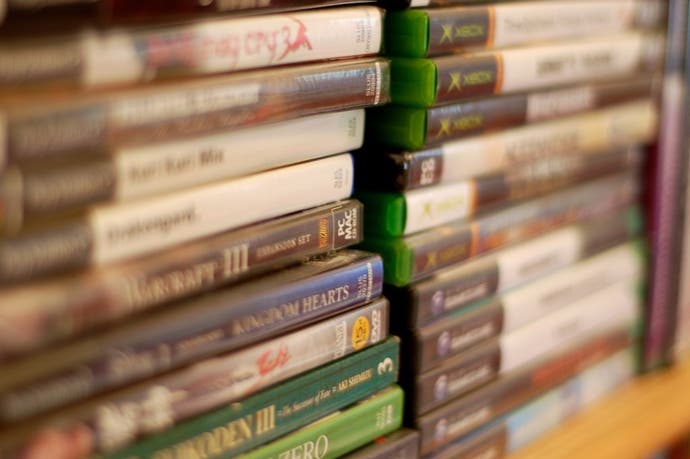Are pre-owned sales killing gaming?
A look at both sides of the argument.
Ratcliffe's site allows gamers to list games for swap or sale, then matches people against each other to make the transaction. Interestingly, speaking to her about GaBoom reveals a degree of displeasure about the retail second-hand market you normally only find amongst game publishers.
Pre-owned sales "don't give the consumer the fair value of their game", she told me. "When you have traded a game with a high street retailer, they then sell that game on for a large profit, which shows the game is worth more than what they give to the consumer who has traded the game in."
In contrast, services like GaBoom - or indeed eBay and Amazon Marketplace - give consumers the real value of their games. Even if developers aren't making any money directly off those sales, they can rest easy knowing nobody else is profiteering from their hard work.
Besides, we all know from experience that if you put a bit of money in a gamer's pocket, there's only one place he's likely to spend it. (No, not the pub. The other one.)
Yet in their desperation to crack down on the second-hand trade, the games business may end up eliminating this option as well. Ratcliffe notes that initiatives like Project Ten Dollar and Online Pass harm all kinds of second-hand consumers - and, by extension, the first-hand buyers who want to trade in their games.
"I very much hope we are not seeing a move towards using online functionality to 'punish' second-hand consumers," she said. "I believe that is wrong. Consumers, whether first or second-hand, should never be 'punished' for purchasing a legal item."

It's all too easy to sneer at games industry executives when they make attacks on the second-hand trade, but look closer and it seems unfair to paint them as evil masterminds. Indeed, if any one group emerges as the pantomime villain, it's the retailers.
Considering the economics of how games are made, distributed and enjoyed, the enormous displays of last week's new releases being sold second-hand for a fiver less seem distasteful. The gigantic Book Off stores which dominate so many Japanese street corners, fantastic though they may be, are blatantly thumbing their noses at the publishers who once tried to shut them down.
If anyone is going to make this much money from games, shouldn't it be those who had a hand in their creation?
Yet even this aspect of the debate is complex. Less than six months ago, the boss of GameStop Sweden told the audience at the Develop Conference that "if we hadn't got the used business, we wouldn't be there".
In blunt terms, he cited the used games business as being the difference between GameStop continuing to open new stores and expand games' presence on the high street - and not being there at all.
Some time earlier, SEGA's Mike Hayes had alluded to that same dichotomy. No matter how much he may dislike the second-hand trade, Sega has "a successful business working with the retailers that offer that service."

The bottom line is that game creators have a deal with the devil - if their efforts to cut down on second-hand sales are too successful, they might end up killing off the very retailers upon whom they rely so heavily.
(In fact one Japanese publishing exec gave me a hatful of vitriol for this article, only to retract the whole lot a few days later - having realised it annoy his retail partners. It's clear who still wears the trousers in many of these relationships.)
So they watch, wait and complain bitterly - all the time hoping for the moment when digital distribution technology will allow them to do what present business reality won't permit. And pray, presumably, that national governments don't wake up to the enormous erosion of consumer rights this represents, and step in to legislate against it.
For GaBoom's Ratcliffe, that day seems a long way off. Even while acknowledging the rise of digital distribution, she argues that a move in that direction won't be catastrophic for game swapping or second-hand sales.
"I am confident the second-hand game market has a long term future and will continue to be successful in the coming years," she said. "When you take into account the fact that 12.4 million people in the UK play second-hand video games, I think it firms up the market's future."
